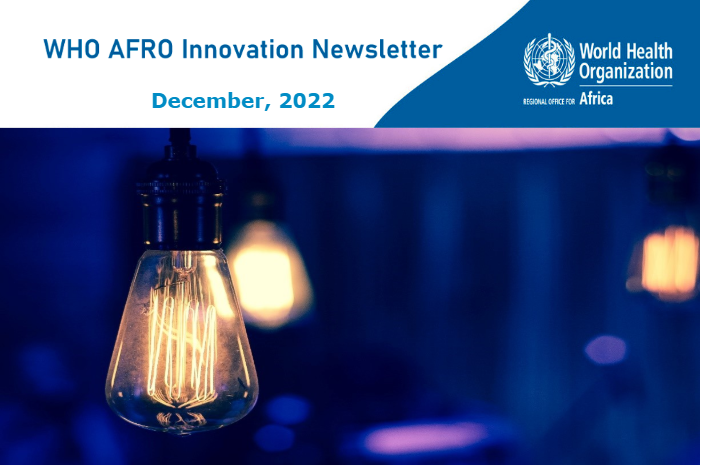
WHO AFRO Innovations Newsletter - December 2022
WHO AFRO Innovation Program
Innovation Highlights
Identifying and fostering the development of innovations for impact
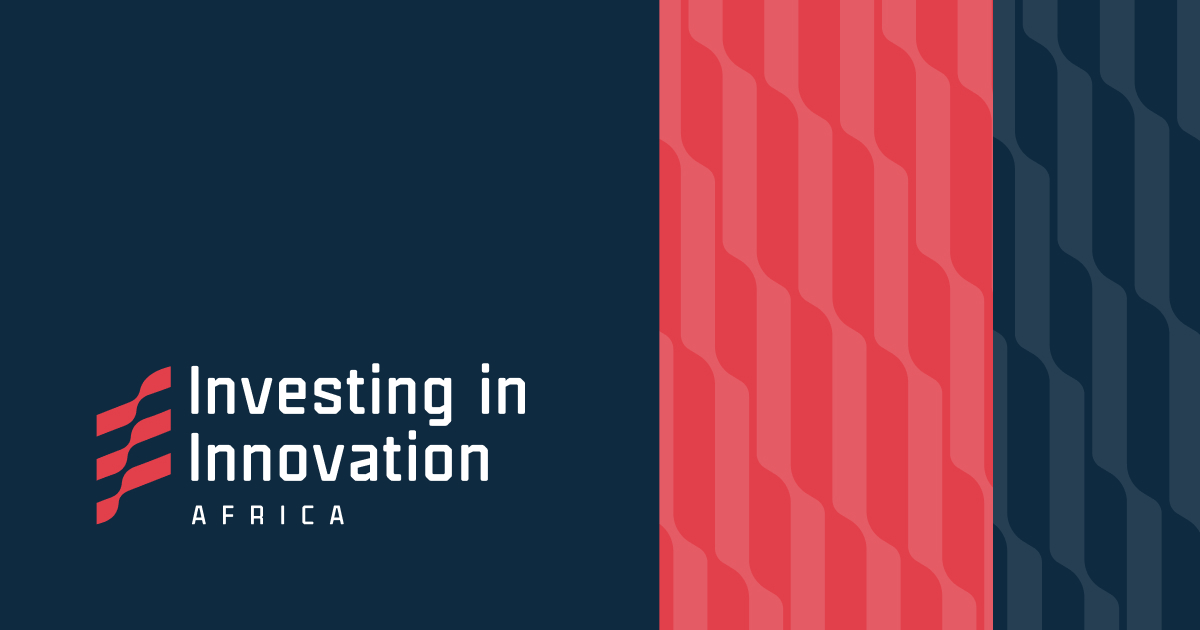 WHO AFRO partnered with the Pan African initiative funded by BMGF- Investing in Innovation (i3) comprising Salient Advisory Services, the Bill and Melinda Gates Foundation, AUDA-NEPAD, MSD, AmerisourceBergen, Southbridge A&I and SCIDaR launched an innovation challenge in July 2022. The innovation challenge identified African start-ups that developed novel solutions, particularly in creating a solution to address the supply chain and health product distribution challenge in Africa targeting difficult-to-reach areas and marginalized communities.
WHO AFRO partnered with the Pan African initiative funded by BMGF- Investing in Innovation (i3) comprising Salient Advisory Services, the Bill and Melinda Gates Foundation, AUDA-NEPAD, MSD, AmerisourceBergen, Southbridge A&I and SCIDaR launched an innovation challenge in July 2022. The innovation challenge identified African start-ups that developed novel solutions, particularly in creating a solution to address the supply chain and health product distribution challenge in Africa targeting difficult-to-reach areas and marginalized communities.
The winners were selected in September 2022 and comprised of a cohort of 30 African innovators who came from 14 different African nations. Thirty percent of the companies are led by women. Each of the 30 companies received a $50,000 grant and support to catalyze growth-driven partnerships with donors, industry, and institutions. The selected cohort showcased their innovations in Abuja, Nigeria from 5-7 December 2022. To know more about the selected cohort and i3 programme click here.
Check out updates on our marketplace for emerging innovations targeting disease areas
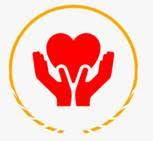 Non-communicable diseases: A compilation of key technological innovations that have been developed across the world to address the NCDs including Diabetes, Cardiovascular diseases, preventable cancers, chronic respiratory diseases, mental health conditions and injuries
Non-communicable diseases: A compilation of key technological innovations that have been developed across the world to address the NCDs including Diabetes, Cardiovascular diseases, preventable cancers, chronic respiratory diseases, mental health conditions and injuries
 Malaria services: Innovation uptake has played a significant role in strengthening the response to Malaria globally. The goal is to share information on the malaria technological innovations that have already made a difference in other parts of the World for Adaptation and scaling in the African region.
Malaria services: Innovation uptake has played a significant role in strengthening the response to Malaria globally. The goal is to share information on the malaria technological innovations that have already made a difference in other parts of the World for Adaptation and scaling in the African region.
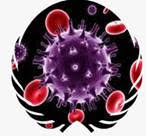 HIV services: Key HIV services technological innovations that have been developed across the world targeting various components of the response, that include prevention, diagnostics, HIV Services access, treatment, behavioural change and strategic information
HIV services: Key HIV services technological innovations that have been developed across the world targeting various components of the response, that include prevention, diagnostics, HIV Services access, treatment, behavioural change and strategic information
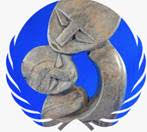 RMNCH services: Most of the mortality and morbidity in women and children can be prevented with effective and affordable interventions that prevent or treat the most common causes of illness. This compendium of innovations is aimed at providing an overview of different technologies that are being used to improve RMNCH.
RMNCH services: Most of the mortality and morbidity in women and children can be prevented with effective and affordable interventions that prevent or treat the most common causes of illness. This compendium of innovations is aimed at providing an overview of different technologies that are being used to improve RMNCH.
.png) Vaccine delivery: Global equitable access to vaccines is a critical aspect of functional health systems. One of the critical stages of the vaccine value and supply chain is the aspect of vaccine delivery. This database, therefore, provides global insights about technologies African countries can adopt to efficiently deliver these vaccines to the citizens.
Vaccine delivery: Global equitable access to vaccines is a critical aspect of functional health systems. One of the critical stages of the vaccine value and supply chain is the aspect of vaccine delivery. This database, therefore, provides global insights about technologies African countries can adopt to efficiently deliver these vaccines to the citizens.
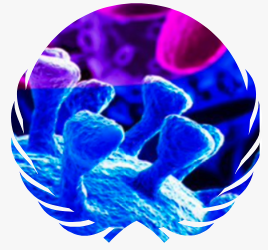 COVID-19: Key HIV services technological innovations that have been developed across the world targeting various components of the response, that include prevention, diagnostics, HIV Services access, treatment, behavioural change and strategic information
COVID-19: Key HIV services technological innovations that have been developed across the world targeting various components of the response, that include prevention, diagnostics, HIV Services access, treatment, behavioural change and strategic information
 AI Innovations: AI has great potential to transform healthcare by improving access and strengthening health systems in Africa. AI is quickly disrupting healthcare in Africa and the continent needs to brace itself for this unavoidable force. This database presents several AI technological innovations that have been developed, deployed, and utilised for health systems strengthening in the African region.
AI Innovations: AI has great potential to transform healthcare by improving access and strengthening health systems in Africa. AI is quickly disrupting healthcare in Africa and the continent needs to brace itself for this unavoidable force. This database presents several AI technological innovations that have been developed, deployed, and utilised for health systems strengthening in the African region.
WHO AFRO harnessing technologies to digitise health campaigns
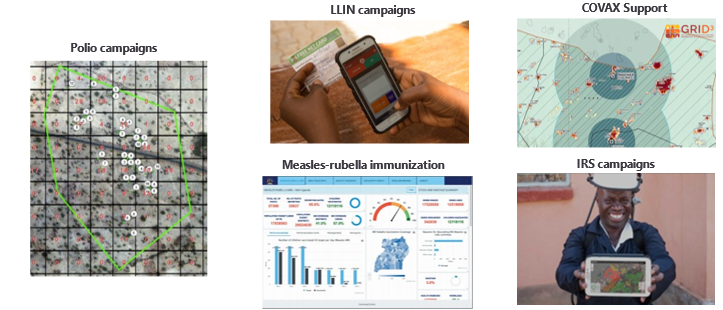
Public health campaigns have long been important instruments for delivering healthcare interventions at scale and with high coverage. In practice, however, many campaigns face challenges in reaching their desired populations and effectively using resources, due to logistical complexities, lack of quality data for operational decision-making, and limited visibility for Ministries of Health and local stakeholders into campaigns. Technology can offer a solution: by better managing logistics and human resources, improving visibility into where interventions have been delivered and what remains to be achieved, and in the process shifting ownership and oversight of well-planned and executed campaigns back to governments.
In view of this, the Clinton Health Access Initiative (CHAI) and WHO AFRO are working with governments in Benin, DRC, Kenya, and Nigeria to digitize and integrate major components of campaign activities across disease programs, including microplanning, supply chain management, campaign worker training, intervention delivery, payment, and monitoring and evaluation. This work is aimed at strengthening the ecosystem for delivering campaigns through digitization ensuring that countries:
-
- have access to strong Global Good technology options to digitize their campaigns
- have practical and accessible guidance for selecting, adapting, and sustainably implementing digital campaign technologies
- have an informed way of integrating campaign technologies with routine health systems
- assist in developing standards, policies, and an enabling environment for digital campaign technologies
- have access to technical assistance and local partners to localize, implement, and maintain their digital campaign technologies
WHO AFRO at the forefront helping countries scaling up health innovations in a sustainable way
Strengthening of countries' innovation ecosystems at the heart of WHO AFRO's work
Botswana Health Innovation Management System
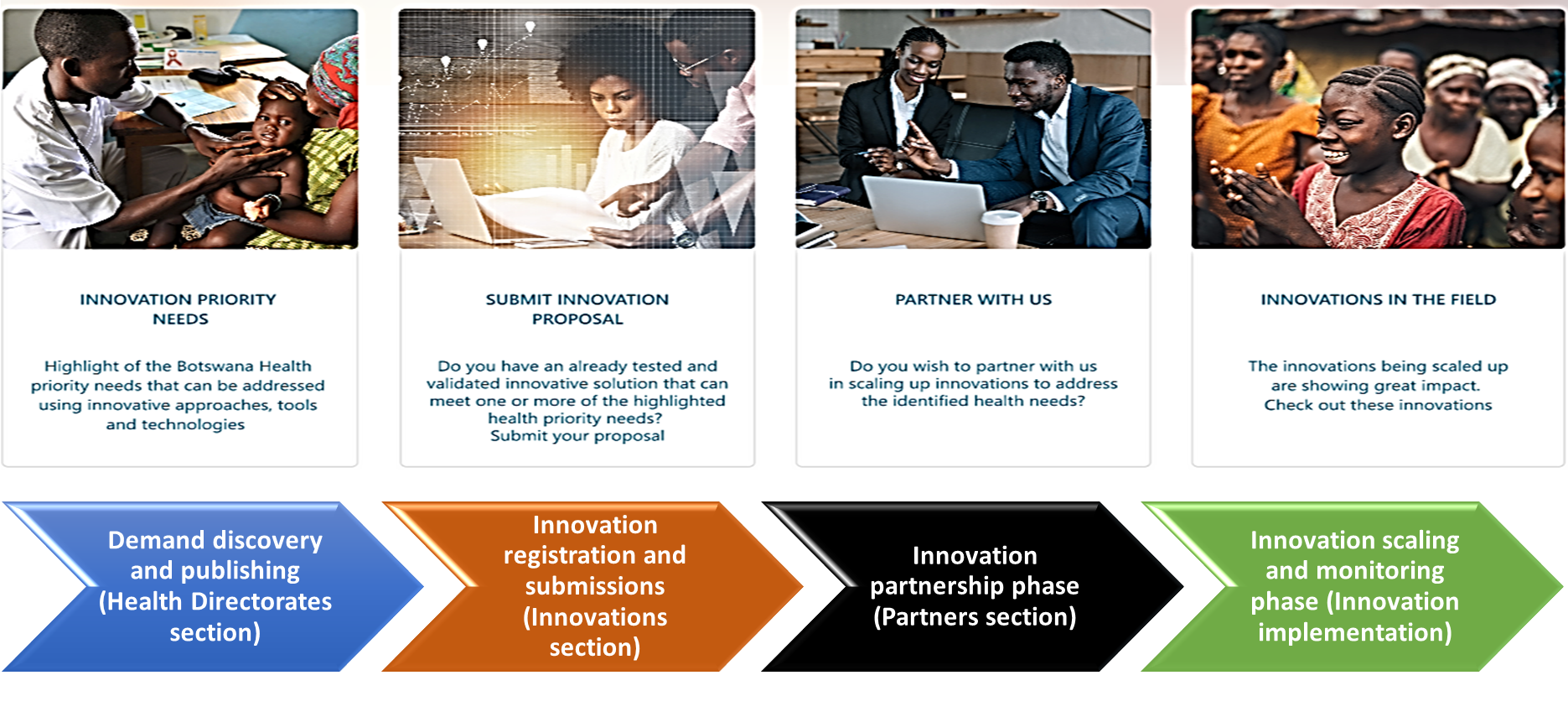 WHO AFRO has been offering technical support to the Botswana Ministry of Health to design, develop and implement an integrated robust web platform to streamline the management of health innovations and emerging technologies. The role of the platform is to facilitate ways of harnessing and fostering the development of health innovations that can be sustainably scaled up to respond to the health needs of the country.
WHO AFRO has been offering technical support to the Botswana Ministry of Health to design, develop and implement an integrated robust web platform to streamline the management of health innovations and emerging technologies. The role of the platform is to facilitate ways of harnessing and fostering the development of health innovations that can be sustainably scaled up to respond to the health needs of the country.
This work has been ongoing in close consultation with a dedicated technical team within the Botswana Ministry of Health. The platform consists of four modules designed to address the following aspects related to the end-to-end process of innovation management:
-
- Articulation of innovation needs to address national health priority needs
- The process of capturing new and ready-to-scale innovative projects from innovators and funders
- Alignment of stakeholders to support scaling up of selected promising innovations that respond to the health priorities
- Provide robust analytics for monitoring and evaluating innovations being scaled up.
The system architecture was developed to be flexible enough to adapt to any feature request or changes that may occur.
Healthcare Innovation Scaling framework
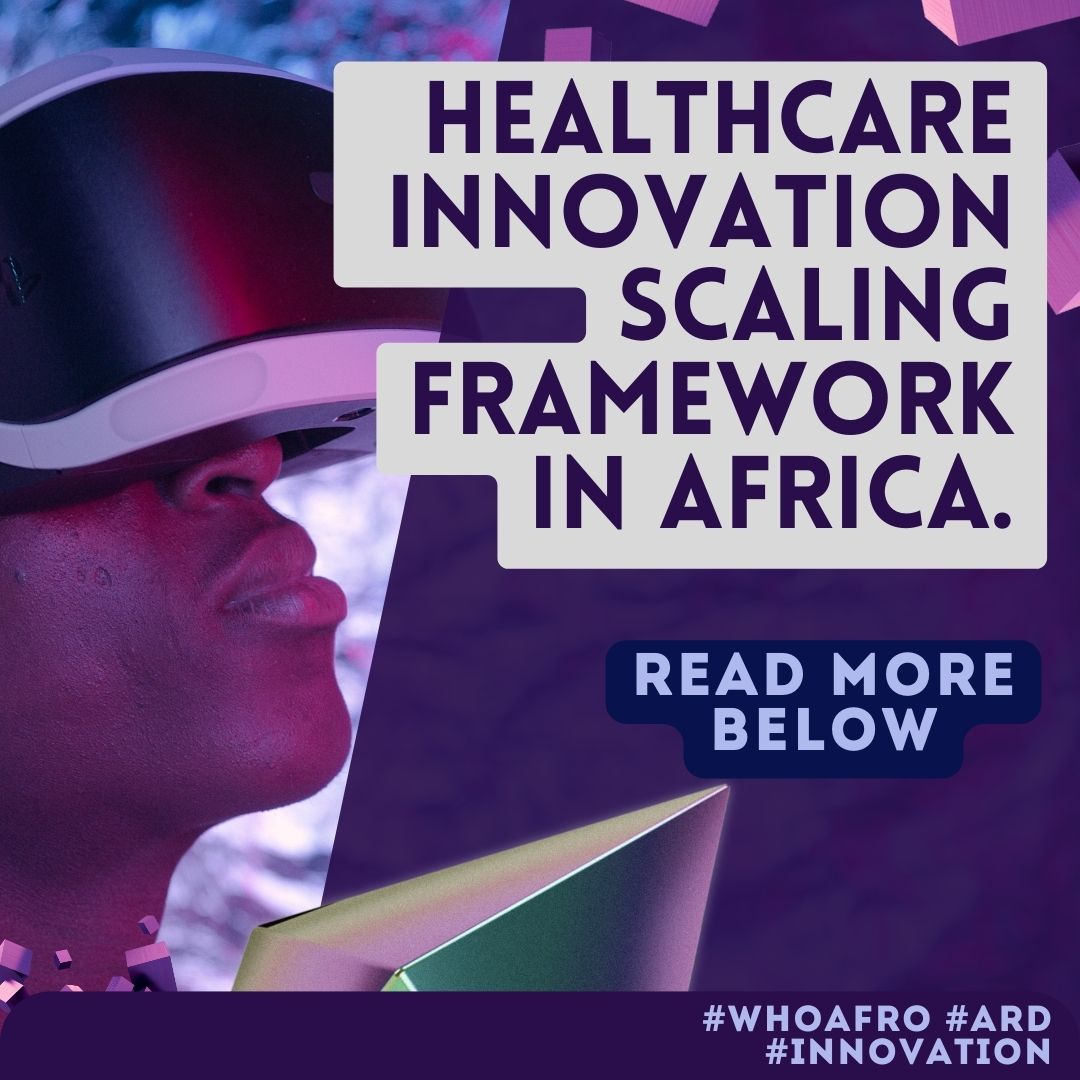
Cultivating supportive innovation ecosystems is key to the integration and sustainable scaling of healthcare innovations. The World Health Organization in Africa conducted a 3-year follow-up study of 2415 innovators who participated in the inaugural WHO AFRO innovation challenge in 2018, with the view to understand key drivers and challenges that contributed to either successes or failures in scaling up their respective innovations.
The study led to the formulation of an evidence-driven healthcare innovation scaling framework comprising 10 pillars with proposed indicators. The insights gained from the study are critical for national governments and other key stakeholders in assessing the capacity of local innovation ecosystems to support sustainable scaling up of innovations. In addition, the framework provides evidence on areas of investment and support towards building a robust ecosystem that harnesses innovations responding to local innovation needs.
Read more about the proposed Healthcare Innovation Scaling Framework
Innovations from Africa making global and regional headlines
WHO AFRO launches an African Innovators’ Network
The COVID-19 pandemic magnified a lot of systemic challenges were magnified across health systems globally and more so in Africa. To address these disparities, there is a need for strategic collaborations and partnerships between innovators and other strategic partners who support further scaling up of home-grown solutions. The Africa Innovators Network featured on WHO Innovation marketplace platform showcases these inspirational innovations from across the African region.
If you are an innovator that is working on strengthening health systems in Africa through product, social or process innovations and you would like to join the African Innovators Network, please send us a request with a description of your innovation to afroinnov@who.int
The spotlight on Innovators from Africa

Name: Ephrem Bekele Woldeyesus
Country: Ethiopia
Innovation: Integrated Mental Wellness Programme
Description: The Integrated Mental Wellness Programme uses social media to drive social change with an aggregate of more than 5 Million Facebook and YouTube engagements. The programme includes support offered through a bi-weekly radio show on mental health, depression, forgiveness therapy, reconciliation, trauma and child and women psychosocial health. Other support services include a range of support under a fee-based model. The initiative is a social enterprise and revenue from the radio show subsidizes the free mental health service for the community members. The programme addresses thousands of women, children and youth in group therapy setups, individual counselling, and different trainings for free.
Progress: The initiative was showcased under the WHO Mental health initiative as an example of innovation in this area. The project will soon expand to a school-based mental and social health programme called Seed Wellness to support families, teachers and counsellors through an integrated solution for quality education and youth-led community impact supported by digital technology
 Name: Franck Verzefé
Name: Franck Verzefé
Country: Cameroon
Innovation: TrueSpec
Description: TrueSpec is a portable device and application that uses artificial intelligence called RAI (Real Active Ingredient) to allow hospitals, pharmacies, pharmaceutical labs and quality control centres to verify if certain drugs are genuine or falsified. This process takes less than 20 seconds and can be conducted anytime and anywhere. This solution allows the user to save money, as well as build a database to help estimate the true impact of substandard or falsified medical products and to collect, structure and systematically analyse accurate, reliable and quality data for Africa. The application was developed by TrueSpec Africa.
Progress: Truespec is working on expanding across Francophone countries with the aim of diversifying the portfolio of drugs that can be identified by the innovation. For his work, Franck has been selected in the 2022 edition of Forbes 30 Under 30 and he is also part of the ITU and the WHO Artificial Intelligence for Health (AI4H) working group.
Innovation in Science
Vaccine Innovation Prioritization Strategy Alliance
WHO AFRO innovation team is part of the Vaccine Innovation Prioritisation Strategy (VIPS) alliance which is a three-year collaboration between the Gavi Secretariat, WHO, Bill & Melinda Gates Foundation (BMGF), United Nations Children’s Fund (UNICEF) and PATH to develop a single integrated framework to evaluate and prioritise vaccine product innovations and to drive these innovations forward. The alliance ascertains that innovative approaches are needed to help to address the disparities around immunisation barriers and achieve immunisation coverage and equity goals. The alliance is involved in in-depth research, stakeholder consultations, and the development and application of a methodology capable of evaluating a variety of technologies at different stages along the product development pipeline continuum. The VIPS Alliance’s long-term vision for vaccine micro-array patches (MAPs) is to implement MAP products for priority vaccines to:
- identify activities needed to accelerate the development and future uptake of vaccine MAP products for LMIC use.
- advocate for vaccine MAPs in general and attract the interest of other global health partners and funders.
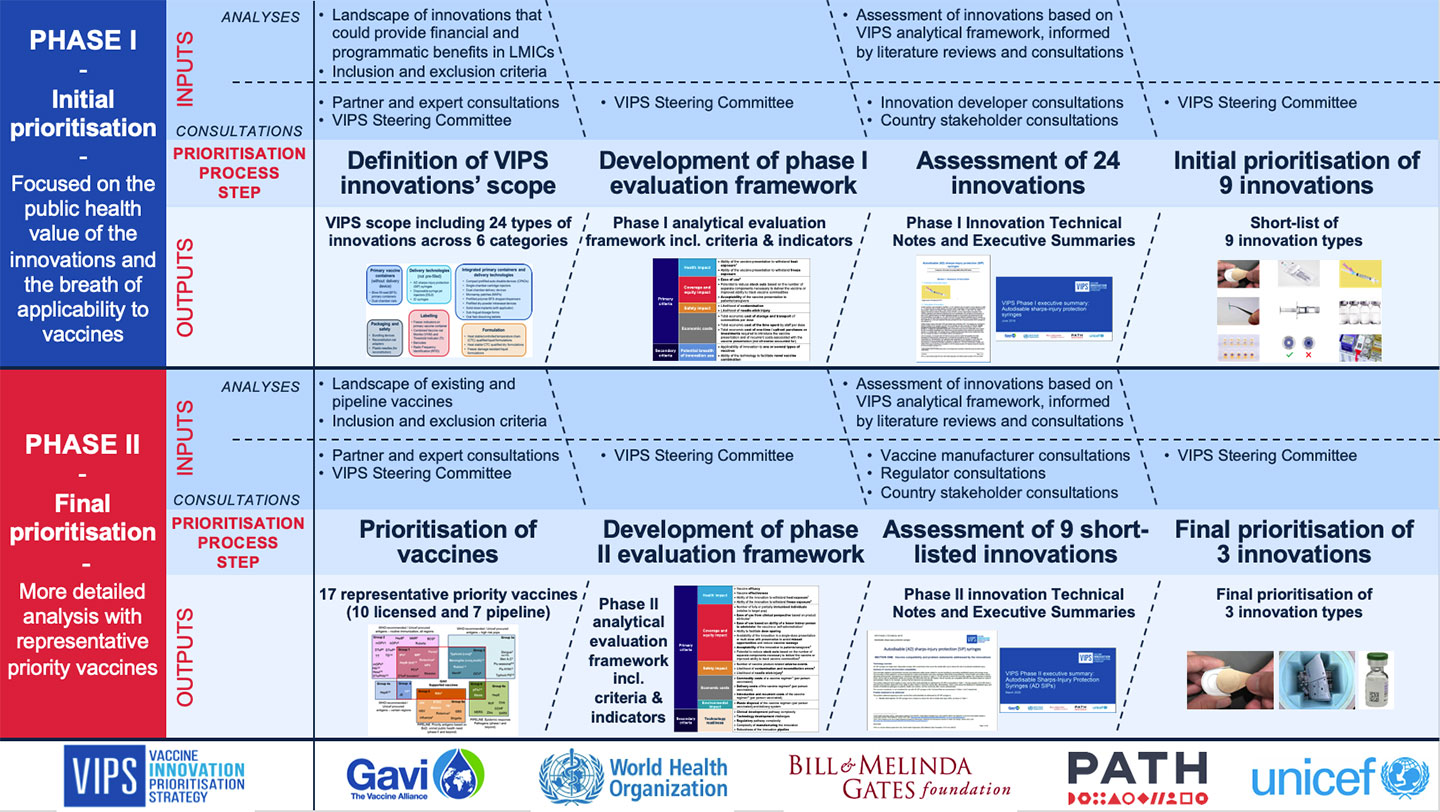
Read here for more information on the VIPS alliance.
WHO AFRO and the EU support local manufacturing and access to vaccines, medicines and health technologies in Africa
.jpg) The European Union Commission and WHO are strengthening their partnership to improve equitable access to safe, effective, and quality-assured vaccines, medicines and health technologies in Sub-Saharan Africa. The EU–WHO partnership will assist the African Union in reaching its target of increasing local vaccine production, in Africa and for Africa. The financial contribution of €24.5 million from the EU supports three main categories of action: regulatory strengthening (€11.5 million), technology transfer (€12 million), and demand consolidation and strategic purchasing (€1 million). It will also support the achievement of African Union objectives in areas such as jobs and growth, trade, and scientific cooperation.
The European Union Commission and WHO are strengthening their partnership to improve equitable access to safe, effective, and quality-assured vaccines, medicines and health technologies in Sub-Saharan Africa. The EU–WHO partnership will assist the African Union in reaching its target of increasing local vaccine production, in Africa and for Africa. The financial contribution of €24.5 million from the EU supports three main categories of action: regulatory strengthening (€11.5 million), technology transfer (€12 million), and demand consolidation and strategic purchasing (€1 million). It will also support the achievement of African Union objectives in areas such as jobs and growth, trade, and scientific cooperation.
More information on the initiative is described here.
Check it out!

The ARD Cluster at WHO AFRO has created an active LinkedIn page aimed at showcasing the innovative activities and outputs that are being done by the cluster. See our work and that of our colleagues at the link below:
Connect with us!

Please access our webpage for additional innovation-related information: innov.afro.who.int/
For specific inquiries, please contact WHO AFRO on afroinnov@who.int
